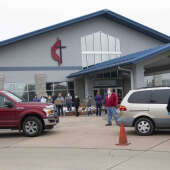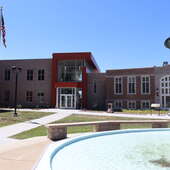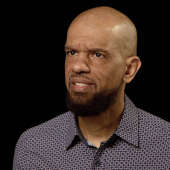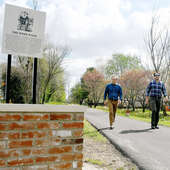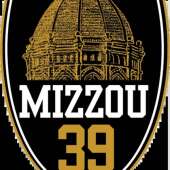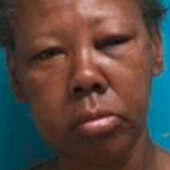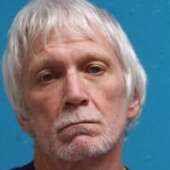This project made possible by the support of Southeast Missouri State University. Among its award-winning departments are Criminal Justice and Sociology, Mass Media and Social Work.
Sunday, December 11, 2016 ~ Updated 10:20 AM
The following story is one installment of an investigative series of the questionable conviction of David Robinson, who is accused of shooting Sheila Box in 2000. Please read all our other related stories and view our video series at www.semissourian.com/lifewithout.
David Robinson fidgets a bit as he puts on the microphone for his second interview with reporters. The setting is the same as his first interview, the family room at Jefferson City Correctional Center.
Robinson meets with a reporter and two photographers without restraints. He wears gray sweats and a white T-shirt. He has been afforded some conveniences for good behavior. The young female guard does not seem to share any of Robinson's apprehension with this meeting.
This time, he's going to be on video. He says he's nervous and wants the interview to go well.
He seems to gets more comfortable as he tells his story. After 16 years, Robinson knows this case backward and forward. He starts his version of events with the night Sheila Box was shot.
Aug. 6, 2000
Robinson, then 32, made a quick stop at Collins convenience store at Malone and Branum avenues in Sikeston, Missouri, on his way back from Buck's club in Howardville, Missouri, he says.
He was driving Corey Turner's Chevy Caprice, having made a deal to let Turner shack up at a hotel, using his ID in exchange for the use of his car.
It was a little after 2 a.m., and police spotlights along Malone Avenue lit up the scene like a high-school football game. Sikeston police still were investigating the scene around Box's crashed Chevy Suburban. Robinson says he remembers hearing the sirens earlier that night when he was at a fish fry at Dora Yarber's house three blocks north of the crash scene. People regularly crashed on Malone; he says he didn't think much of it, but he checked it out before heading over to the Manhattan Room at about 11 p.m.
Some people Robinson knew from the Sunset neighborhood were milling about in front of the store at 2 a.m. Robinson says he asked them what was going on, and one of them told him he was the primary suspect in a woman's murder.
Robinson says he remembers being shocked.
He took Branum Avenue and circled back to his house on Magnolia Street, stopping at his mother's place at 323 Sunset Drive on the way.
"Sikeston's kind of rowdy," he says. "I wanted to keep my mom from worrying. I let my mother know I'm back. I'm alright."
Robinson recalls the conversation with his mother, Jennett McCaster, who confirmed the conversation later with a reporter.

"Momma, did you hear about the white lady that got shot?" Robinson asked his mother. "You know every time something happens, they come to me. I don't know anything about it."
Robinson made it home and talked to his then-girlfriend, Natalia Lawrence. In an interview with the Southeast Missourian at her home in Memphis, Tennessee, Lawrence said she recalls Robinson saying he was 'fittin' to go to jail.'
Robinson says he planned to go to the police station with a lawyer, but he saw Drew Juden, then a captain with the Sikeston Department of Public Safety, standing in his yard next to a Crown Victoria.
Juden asked him where he had been that night.
"Hey, what are you trying to insinuate? You telling people I done killed somebody?" Robinson said.
Juden asked how Robinson knew about a murder.
"Come on, man; Sikeston ain't that big," Robinson recalls saying to the officer. "People heard about it."
Robinson says he knew the situation was serious when Juden pulled his gun.
Robinson kicked a car, setting off an alarm. Lawrence said Robinson was slammed to the ground and hauled away.
McCaster said she went to the scene, but police would not tell her why her son was being arrested.
Juden, Sikeston's current police chief, declined requests by the Southeast Missourian for an interview.
"We cannot comment until all legal proceedings are complete," Juden wrote in an email. "It has been agreed on with the [Attorney General's] office."
In a police report from that night, Detective John Blakely wrote Robinson was yelling at Juden. Blakely wrote Robinson was known to be armed and dangerous but was apprehended without incident.
October 1983 through 2000
Blakely noted in his report he knew Robinson well, interacting with him on several criminal matters.
Robinson admits he had a history with Sikeston and Scott County law-enforcement officers, and he was a focus of many police efforts.
"I gave them the blues in the past," he says. "I ain't no saint."
In 1983, Robinson, then 15, was convicted of second-degree burglary and felony stealing. He originally was sent to Scott County Jail, but his probation was revoked, and he was sent to prison as an adult.
"He got sentenced to shock time in jail, and he started whipping everybody's asses," former Scott County jailer Jim Chambers said in an interview with the Southeast Missourian this summer.
It didn't take Robinson long to get in trouble again. In 1989, he was convicted of second-degree assault, drug possession and first-degree tampering with a service utility and was given a three-year prison sentence.
He was convicted of misdemeanor resisting arrest in 1991, receiving a six-month sentence. In 1992, he was convicted of distribution of a controlled substance, and in 1997, he was convicted of unlawful use of a weapon.

"In '97, I was arrested for unlawful use, being in possession of [a weapon]," Robinson said. "They say I shot somebody, but that person wouldn't testify, so they charged (me) with unlawful use of a weapon that they never got."
McCaster said her son acted out when he was younger because he did not know his father, unlike his siblings.
"He really wasn't a bad kid; everybody in the neighborhood knew him," McCaster said. "Things just got out of hand. ... Once you get in trouble, they target you."
Albert Baker, who later testified against Robinson, said in a 2012 recorded interview with Robinson's lawyer, Jim Wyrsch, that Sikeston police viewed Robinson as a menace to society.
McCaster and Lawrence, Robinson's girlfriend at the time, said Robinson was trying to remake his life when he was released from prison in March 2000, trying to stay out of trouble and make an honest living. He says he was working in lawn care and on his cousin's ice-cream truck.
In an interview, Chambers said Robinson had the reputation of an enforcer -- a person who would act as the violent hand of a drug dealer -- for "the big guys down there."
Robinson says on the night of the murder, he went to a reception hall in Sikeston called the Manhattan Room and Buck's, a club in Howardville, with Roderick Marks and Corey Turner. Turner and Marks were part of a federal drug case in 2011.
Turner was sentenced to life in prison for distributing more than five kilograms of cocaine. Marks was found guilty of conspiracy to distribute more than five kilograms of cocaine and was sentenced to 10 years in prison.
Turner wrote a letter to the Southeast Missourian from Pennsylvania were he is incarcerated, refuting the idea Robinson was an enforcer.
"There is no way David Robinson committed this murder. When we were coming up, David Robinson was a known 'good fighter,' but he had no reputation for carrying a gun or using a gun during any altercation," Turner wrote. "David was outspoken to anybody, and he constantly displayed his displeasure with how the police treated black people (as) opposed to whites."
Robinson says one reason for his animosity toward police involved their conduct when he was shot with buckshot two months before Box's murder.
Robinson says he was drunk when he was shot leaving a convenience store at Luther and Osage streets. He says he does not know who shot him. He decided not to move for fear of creating other medical problems.
Robinson and Lawrence, who later came to the scene, said it took emergency personnel more than an hour to respond. Turner remembered the incident and wrote that Robinson cussed out police and EMTs when they arrived.
Robinson says he later talked to Capt. Dan Armour in the hospital. They had a prior interaction; when Robinson was 15, he took Armour's gun, he says.
Robinson says Armour told him police were slow to respond to the scene when they found out he was the victim. He says Armour also was displeased he could not identify the shooter.
"I was shot in the back," Robinson says. "I don't have eyes in the back of my head."
Robinson says he kicked Armour from his hospital bed.
Aug. 5, 2000
Police began pursuing Robinson as a suspect in Box's death shortly after she was found. They were following a tip from a confidential informant named Russell Mountjoy, according to Blakely's testimony from an evidentiary hearing in 2015.
The original report states the murder took place at the intersection Westgate and Washington streets, a different location from where Baker said the murder took place.
After Robinson was taken into custody during the early morning hours of the murder, detective Mike Williams checked out his alibi, which became a focal point for both sides during his trial.
Jim Wyrsch, one of Robinson's lawyers who picked up Robinson's case in 2009, felt focusing heavily on Robinson's alibi at trial might have hurt his defense, because it gave the prosecution places to poke holes.
Robinson says he started the night of the murder at Brian Keith West's house at 109 Westgate, working on the thermostat of Lawrence's 1991 Buick Regal. He says he was there until about 8:30 p.m. and then went home to 387 Magnolia St., where he took a shower and changed clothes.

He says he then attended the fish fry at Yarber's house from just after 8:30 to 11 p.m.
Robinson says after he left the fish fry, he grabbed something at a convenience store at Luther and Osage streets for a wedding reception he was attending at the Manhattan Room on Center Street. Then he went to the reception, where he met Turner and Marks.
Robinson says he had been driving Lawrence's car and decided to drop it off with her before heading to Buck's club in Howardville, about 20 miles away. Robinson says he stayed at the club until it closed about 1:30 a.m. and then arrived back in Sikeston between 2 and 2:30 a.m.

Box was most likely shot between 10:30 p.m. and 11, based on the testimony of Cheers employees who said she left the restaurant just before 10:30 p.m., a security guard at The Tradewinds who said Box crashed her car into the flea market between 10:30 p.m. and 11 and a Sikeston police officer who received a call about the crash about 11 p.m.
The defense witnesses at Robinson's trial all confirmed they saw him on the night of Aug. 5, but many of their times conflicted. Three people testified that Robinson was at the fish fry until 11 p.m., but Lawrence said Robinson dropped off the car at 10:30 p.m. at the latest, in her testimony. She also said in a later interview that Robinson changed clothes between the fish fry and heading to the Buck's.
Marks testified that Robinson was working on the Buick during the time of the fish fry and did not change clothes before heading to the Manhattan Room.
Turner wrote in his letter that he remembered meeting Robinson at the Manhattan Room between 10:30 p.m. and 11.
Hugh Collins testified Robinson was in an out of his convenience store at Luther and Osage streets five times during the fish fry and could have been in his store as late as 10:45 p.m. Testimony from Collins, detective Williams and Blakely determined that there was not a video from the Luther and Osage street store or the store at Malone and Branum Avenues.
Former assistant attorney general Elizabeth Bock addressed the way she approached the alibi in her testimony at Robinson's evidentiary hearing in May 2015.
"One thing that was important to us and the jury at the time was that Mr. Robinson gave an extensive alibi. And it changed, and it changed, and they heard that alibi. That was his defense. And it changed, and the jury heard it changed," Bock said. "I mean, he went forward with an alibi defense at trial, which was something he chose to do, and we popped his alibi."
Bock declined to be interviewed by the Southeast Missourian for this story.
Multiple messages left with public defender Chris Davis were not returned.
Washington University law professor Peter Joy said he understands why the defense went with so many witnesses at trial, but it is the prosecution's prerogative to attack the timeline put forth by witnesses.
"When you put multiple witnesses on, they're going to have time off; they're going to observe things a little differently, but that's human nature," Joy said.
Aug. 30, 2000
Police checked Robinson's clothes for gunshot residue and DNA. They checked Turner's vehicle and Lawrence's Buick Regal for evidence. They found nothing.
"Everything they took cleared me," Robinson says.
He was released from Sikeston city jail and was transferred to Mississippi County Jail in Charleston, Missouri. Investigators found a joint in Turner's car, and Robinson was processed for parole violation. After he passed a drug test, Robinson was released from jail Aug. 9.
Between Aug. 9 and Aug. 30, Robinson continued hearing rumors he was a prime suspect in Box's murder. One friend told him police were searching near the intersection of Branum and Malone for evidence, where Baker told police the crime occurred.
Robinson says he was not worried, because he had nothing to do with the crime. He was also helping his brother Justin prepare to go off to Hutchinson Community College in Kansas.
"I stayed around because my conscience was clear," Robinson says. "I know I didn't commit no murder."
Robinson was arrested Aug. 30 while walking between his mother's house and his own and was charged with Box's murder.
Robinson says he was extremely upset and asked Armour if he could speak with detective Williams. Robinson, Armour and Williams spoke in Williams' office at the police station, according to Williams' testimony at Robinson's trial.
"He just wanted to know what was going on, why he was arrested," Williams testified in court. "... I just said that Blakely compiled enough evidence to get a warrant for his arrest for the murder of Sheila Box."
Williams continued that Robinson asked why he had not checked his story, and Williams responded that Robinson's story differed from Turner's story.
In his letter to the newspaper, Turner said he talked to Williams, and Williams examined his hotel room.
"I wasn't friendly with Mike Williams, because I knew him to be a crooked cop. I allowed him a quick visual of the room, only as a safety precaution to verify nobody else was in the room," Turner wrote. "I told him the exact same story I described at the beginning of this letter. There is only one story to tell and that's the truth, so I couldn't have possibly told Detective Williams a different story from David Robinson."
Williams testified Robinson's story changed from Aug. 6 to Aug. 30.
"[Robinson] stated from 9 to 11 p.m., one night he was at Corey Turner's house," Williams said.
"Was that different than what he had told you three weeks before?" Bock asked.
"(It was the) difference between going there at 8 and 9, leaving at 9:30 to 11:30, you know, just a time element difference."
Williams went over some of the changes in the timeline, including Robinson going to West's house at 11 p.m. to get the thermostat inspected, then he went to Collins' to buy a gift for the reception, then they went to the Manhattan Room and then to Buck's.
Williams continued with statements from Robinson about the murder.
"He said it was the easiest charge to beat; you just had to do it alone," Williams said.
"Did Mr. Robinson make any statements to you about controlling an area?" Bock asked.
"Yes, he stated that I controlled Sunset," Williams said. "No one does anything to me and gets away with it."
"Did he say anything about Sheila Box in your presence or any woman in your presence?" Bock asked later.
"Sheila Box was brought up by Captain Armour at one point ... as an investigative tool," Williams said. "... He stated that he didn't kill her, and told Armour, quit trying to make her out to be a woman, church woman."
"What was his next remark?" Bock asked.
"Y'all the one that made me a killer."
Williams testified during cross examination that Robinson's comments were not recorded on video or audio tape. Robinson said he did not say "murder was the easiest charge to beat" or that "he ran Sunset."
Robinson agreed that he stated stop trying to make Box into a church lady and "y'all the one that made me a killer."
All of these comments were used by Bock in her closing argument to the jury.
"On Aug. 30, what's he say about Sheila Box? Quit trying to make her (into) a church woman. Interesting statement for someone that's not supposed to know anything about this lady."
"You made me a killer, y'all made me a killer. Y'all the one that made me a killer. Murder's the easiest thing to get away with if you do it alone. That's true and he did it alone, and he did it right there."
"Who controls sunset? You don't do anything to me, it comes back to you … Who controls Sunset? He controls Sunset," Bock said.
Aug. 31, 2001
The jury deliberated about four hours, and McCaster and Lawrence were still hopeful that Robinson would be coming home.
The jury foreman read the verdict.
"As to Count I, we the jury find the defendant, David Robinson, guilty of murder in the first degree," she said. "We assess and declare the punishment for murder in the first degree at imprisonment for life without eligibility for probation or parole."
McCaster fell ill at the announcement, having to be rushed to the emergency room. Justin Robinson and Lawrence said Box's family turned to them and said they thought Robinson was innocent.
"I thought the world had ended," David Robinson says.
Pertinent address: 8200 No More Victims Road, Jefferson City, MO
Editor's note: This project made possible by the support of Southeast Missouri State University. Among its award-winning programs are Criminal Justice and Sociology, Mass Media and Social Work.
Related links
- Life Without: Chapter 1, the confession (12/11/16)
- Life Without: Chapter 2, the star witness recants (12/11/16)
- Life Without: Chapter 3, a second witness recants his testimony (12/11/16)
- Life Without: Chapter 5, the fallout (12/11/16)
- Life Without, Chapter 6: Why is Robinson still in prison? (12/11/16)








